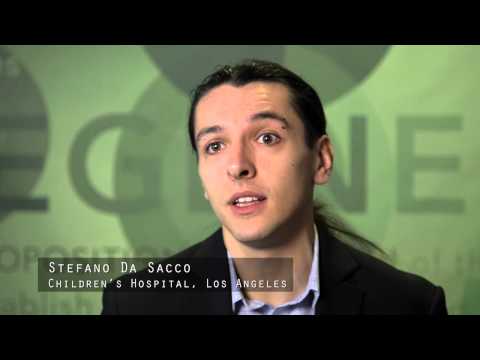Kidney disease
CIRM funds many projects seeking to better understand kidney disease and to translate those discoveries into new therapies.
Description
Chronic kidney disease affects more than 30 million Americans and the number at risk of getting the disease is much higher. Kidneys have a very important job in keeping your body healthy. They act as filters, cleaning the blood that circulates to all your organs and tissues, removing excess water and cellular waste products. They also help regulate your blood pressure. When kidneys are damaged or diseased, they can’t carry out these important functions and patients can suffer permanent damage to their health.
There are many diseases that affect kidney function. The main risk factors include diabetes, high blood pressure, heart disease and having a genetic predisposition. There is no cure for chronic kidney disease, which happens when kidney function progressively worsens over time, so doctors have turned to kidney replacement strategies including dialysis and kidney transplantation.
CIRM has funded research that could help people with kidney disease or kidney failure. Some of the work we’ve funded focuses on early stage research where scientists explore how to mature pluripotent stem cells into different types of kidney cells. The goal of this type of research is to gain a better understanding of kidney development and function, and to identify new stem cell-based therapies to treat kidney disease.
CIRM is also funding later stage research projects that are now in clinical trials. These involve stem cell-based therapies to improve the outcome of patients receiving kidney transplants and a bioengineered vein to help patients on dialysis. You can read more about our ongoing clinical trials below.
Clinical Stage Programs
Humacyte Inc.
Humacyte is using donor cells to create a bioengineered vein needed by people undergoing hemodialysis, the most common form of dialysis. In dialysis a person is connected to a machine that removes waste from their blood. The bioengineered vein is implanted in the arm and used to carry the patient’s blood to and from their body during dialysis. Over time the patient’s own stem cells start to populate this vein, in effect making it part of the patient’s own body. In two separate clinical trials, the Humacyte product is being compared head-to-head with the current standard of care as well as a synthetic product that is used by some patients who are not candidates for the standard treatment.
Learn more about Humacyte’s clinical trials:
- Phase III HUMANITY Trial for end stage kidney disease
- Learn more about the HUMANITY trial on clinicaltrials.gov
- Phase III HAV-ACCESS Trial for end stage kidney disease
- Learn more about the HAV-ACCESS trial on clinical trials.gov
- Blog: Bioengineered veins give hope to kidney disease patients on dialysis
- News Release: CIRM Invests $10 Million in Clinical Trial to Improve Dialysis
Stanford University
A team at Stanford University will work with kidney transplant patients to see if injecting blood stem cells and T cells (which plays an important role in the immune system) from the kidney donor into the kidney recipient can enable the recipient to bypass a life-long dependence on immunosuppressant drugs, which are needed to prevent organ rejection.
- Read more about this trial
- Learn more about this trial on clinicaltrials.gov
- News Release: Clinical Trials to Help Kidney Transplant Patients and Defeat Blindness Get Support from Stem Cell Agency Board
Stanford University
Dr. Everett Meyer, and his team are using a combination of healthy donor stem cells and the patient’s own regulatory T cells (Tregs), to train the patient’s immune system to accept the transplanted kidney and eliminate the need for immunosuppressive drugs. The initial group targeted in this clinical trial are people with what are called HLA-mismatched kidneys. This is where the donor and recipient do not share the same human leukocyte antigens (HLAs), proteins located on the surface of immune cells and other cells in the body. Around 50 percent of patients with HLA-mismatched transplants experience rejection of the organ. The goal is “one kidney for life” off drugs with safety for all patients. The team hope that be eliminating the needs for immunosuppressive drugs the health of the patients will improve due to reduction in side effects associated with these drugs, and reduced likelihood of the body rejecting the transplanted organ.
Medeor Therapeutics
Patients who receive kidney transplants must take life-long immunosuppressive drugs to prevent their immune system from rejecting the transplant. Over time, these drugs are toxic and can increase a patient’s risk of infection, heart disease, cancer and diabetes. Medeor Therapeutics has developed a stem cell-based treatment they hope will eliminate the need for immunosuppressive drugs in kidney transplant patients. Blood-forming stem cells and immune cells from the organ donor are infused into the patient receiving the donor’s kidney. By introducing the donor’s immune cells into the patient, the patient’s immune system is able to tolerate the donor’s kidney, potentially eliminating the need for immunosuppressive drugs that are normally necessary to prevent transplant rejection. Medeor is currently testing this treatment in a Phase 3 clinical trial.
- Read more about this trial
- Learn more about this trial on clinicaltrials.gov
- News Release: California’s Stem Cell Agency Invests in Phase 3 Clinical Trial to Help Kidney Transplant Patients
CIRM Grants Targeting Kidney Disease
CIRM Videos About Kidney Disease
 Stefano Da Sacco, CHLA – CIRM Stem Cell #SciencePitch |
 Sargis Sedrakyan, CHLA – CIRM Stem Cell #SciencePitch |
 Andrew McMahon, USC – CIRM Stem Cell #SciencePitch |
